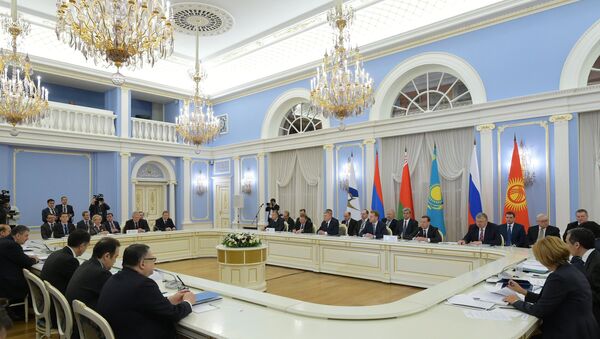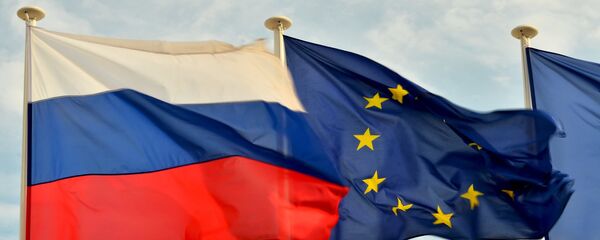MOSCOW (Sputnik) — Earlier in the day, an international business forum "Belgium, Luxembourg — the Eurasian Economic Union. Evolution of the New World" kicked off in Moscow. The forum is organized by the Russian Chamber of Commerce and Industry and the Belgian-Luxembourg Chamber of Commerce in Russia.
"Now we are working actively to establish ties with the Eurasian Economic Union to have access to the four other countries [Kyrgyzstan, Armenia, Belarus, and Kazakhstan] through which we can also work with Russia. This is of great importance for us," Arkady Arianoff said.
Many European companies, including those in Belgium and Luxembourg are suffering from being uninformed on the conditions of the sanctions against Russia and the Russian-imposed food embargo, the general manager of BLCC in Moscow added.
"The problem with the sanctions and the [Russian] embargo has affected many companies [in Belgium and Luxembourg] with the [mainstream] media playing a bad role in it [portraying sanctions and embargo as unlimited], as well as the banks which misunderstood the nature of the sanctions and think that having business with Russia is entirely prohibited," Arianoff said.
The Eurasian Economic Union is a Russia-initiated regional political and economic bloc that aims to streamline the flow of goods and services between its members, namely Russia, Kyrgyzstan, Armenia, Belarus, and Kazakhstan.
Belgium, Luxembourg Copy Anti-Russia Sanctions Over US, EU Economic Ties
Belgium and Luxembourg follow the US and EU sanctions policy against Russia due to strong economic ties with Washington and Berlin, Arianoff told Sputnik.
"Of course, many EU countries are sick of the sanctions such as Italy and Austria but for now, Belgium and Luxembourg are in a very curious situation, because they have lots of investments in the United States and Germany so it is hard to abandon their [foreign] policy," he said.
Negatively affected by the sanctions, the trade turnover between the European Union and Russia has shrunk dramatically since 2013. According to the European Commission data, EU imports from Russia fell from over 200 billion euros ($220 billion) in 2013 to less than 140 billion euros in 2015. Exports dropped from 120 billion euros to less than 80 billion euros in 2015, respectively.
The current situation with the EU-Russian trade turnover will remain on the same level under the existing US and EU administrations, Arianoff added.
"To be honest, I don’t see a way out [for the EU-Russian trade turnover to grow] while we have [Chancellor Angela] Merkel in Germany, [President Francois] Hollande in France, [US President Barack] Obama, and, regretfully maybe [Hillary] Clinton in the United States," the BLCC general manager noted.
Belgium and Luxembourg, both members of the European Union, have joined economic sanctions against Moscow. The sanctions are set to remain in place until January 31, 2017, and restrictive measures against some Russian citizens and legal entities are valid until March 15 of the same year.


